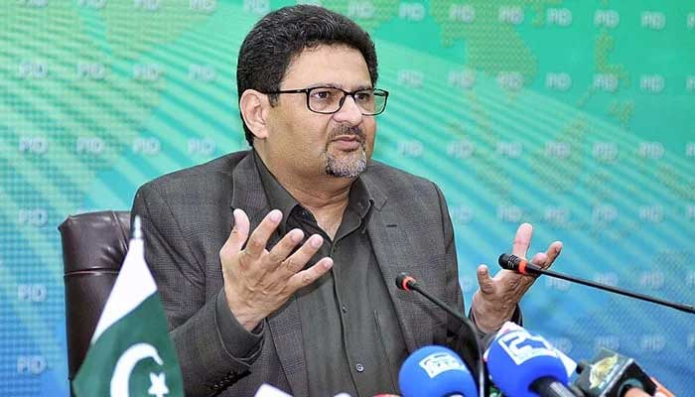ISLAMABAD, JULY 28 (DNA): After Federal Minister for Parliamentary Affairs Dr Tariq Fazal Chaudhry accused former finance minister Miftah Ismail of awarding a Benazir Nashonuma Programme contract to his own company, the controversy has deepened.
The government is alleging conflict of interest and misuse of authority. Miftah, however, denies wrongdoing, saying he had no role in approving or enhancing the programme’s budget or influencing the contract process. With both sides sticking to their claims, the matter has taken a serious turn, raising questions over conflict of interest, transparency and political point-scoring.
To understand the roots of this allegation, it’s essential to revisit how the Benazir Nashonuma Programme was conceived and how Ismail Industries came into the picture. In December 2019, the Benazir Income Support Programme (BISP) Board approved a plan to combat child stunting and malnutrition by distributing Specialized Nutritious Food (SNF) in high-risk districts. Given its technical expertise, the United Nations World Food Programme (WFP) was chosen as the implementing partner. The BISP Board was briefed that this would be launched in a few districts as a pilot project and the WFP performance will be reviewed after scaling it up all across the country. The Board minutes also reveal that the required nutrition SNF is already being produced in Pakistan.
Over the next few years, allocations for Nashonuma grew rapidly as reflected in the budget documents. In 2020–21, Rs2.098 billion were allocated for the Benazir Nashonuma Programme, which increased to Rs4.87 billion in 2021–22. The allocation further rose to Rs20.66 billion in 2022–23, Rs34.67 billion in 2023–24, and Rs42.10 billion in 2024–25. During the period from 2022–23 to 2024–25, Ismail Industries Limited served as the sole supplier of Specialized Nutritious Food (SNF) under the programme and received approximately Rs47 billion for procurement and supply of SNF.
After Imran Khan’s government was toppled in April 2022, Miftah Ismail was appointed finance minister in the PDM-led government. He held the position for about six months, from April to September 2022, before stepping down. Below are the two sides of the story.
Government’s stance
A couple of days ago, Federal Minister for Parliamentary Affairs Dr Tariq Fazal Chaudhry told the Senate that Rs97 billion have been allocated for the Benazir Nashonuma Programme since 2022. He alleged that Miftah Ismail, during his tenure as Finance Minister, increased the programme’s budget and awarded the Specialized Nutritious Food (SNF) contract to his own company, Ismail Industries Limited. Dr Fazal questioned how a sitting minister could approve such a major contract for a firm he is linked to, calling it a clear case of conflict of interest.
A highly placed government spokesperson elaborated on why the finance ministry, and not the implementing ministry, holds the ultimate authority in such cases. The spokesperson said, “Let me give you an example why Miftah Ismail is responsible for increasing the budget for BNP. No ministry can enhance its own budget without the consent of the finance ministry. Every time I enhance the publicity budget I have to go to the finance ministry for approval. Every allocation is done by finance. Ministries can only give recommendations. No ministry minds an enhanced allocation and especially when finance is doing it on their own.”
The government’s spokesperson further adds, “As finance minister Miftah Ismail should’ve declared it that his company is a beneficiary of this programme and recused himself from cabinet and other forums. He should have declared a conflict of interest. The finance minister is the ultimate decision maker and it was a huge jump in allocation.”
Miftah Ismail’s point of view
Miftah Ismail, in a detailed response to The News, denied any role in budgetary decisions for the Nashonuma Programme, stating that all procurements and allocations were handled independently by the relevant ministries.
Miftah Ismail said, “Everyone in Pakistan knows my family owns Ismail Industries Ltd, and, of course, the PM and my cabinet colleagues knew about it. The budget of the Nashonuma programme was set by the BISP and Poverty Alleviation ministry and not by the finance ministry. I didn’t even know till today what the numbers were.”
“The budget for Nashonuma kept increasing in subsequent years, even after I left in 5 months at the ministry. And the reason for this is probably insistence by World Bank and IMF and also BISP priorities of reducing stunting. The BISP business in the year I was FM was less than 10 percent of our company’s business. You can ask people if I have ever even spoken to anyone at BISP, Poverty Alleviation, Finance, WFP about this programme or my business generally,” he commented.
“I wasn’t making any decisions about the programme hence, there was no conflict of interest. And who was I supposed to submit this ‘disclosure certificate’ to? As everyone already knows, my family owns Ismail Industries,” Miftah commented.
“Just for context, with information taken from the BISP website, the total BISP budget went from Rs236 billion to Rs412 billion from 2021-22 to 2022-23. And it has kept increasing at a fast pace since then. The budget for Waseela-e-Taleem went from Rs8 billion to Rs20 billion in that period and the budget for Nashonuma went from Rs5 billion (and not Rs2 billion as you say) to Rs20 billion. So, the BISP Board was increasing the amount of several programmes. Pakistan has been increasing the total BISP programme in recent years quite rapidly, also partially because of the IMF and World Bank,” Miftah explained while responding to this correspondent’s questions.
About the time period of supplying food supplements to UN Agencies, Miftah replied, “We have been engaged in this business for two decades and started this business at the invitation of WFP — which wanted to develop this capacity in developing countries. We are now the largest producer of SNF in the world, bigger now than the French company Nutraset. Ours in an international success story where a Pakistani company has become bigger than many European and American companies. “We are also suppliers to MSF (Medicine Sans Frontiers), ICRC (International Committee of the Red Cross), Action Against Hunger, Aga Khan Development Network, World Health Organisation, Bill and Melinda Gates Foundation, and many more NGOs. We supply SNF to WFP headquarters in Rome, WFP Pakistan, UNICEF Central Supply Division in Copenhagen, and UNICEF Pakistan. Through them we supply to Afghanistan, Bangladesh, Myanmar, Sudan, Yemen, Lebanon, Malawi, Chad, Syria, Kenya, etc,” he informed.
As the government maintains its stance of conflict of interest and budgetary influence, and Miftah Ismail continues to deny any role in the allocation process or procurement decisions, the controversy deepens. Both sides have presented their arguments, official records and explanations. Given the scale of public funds involved and the political implications, the matter is expected to remain in focus in the coming days.

















